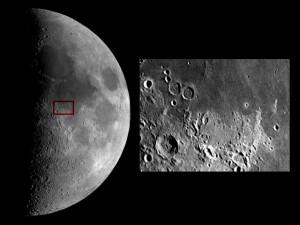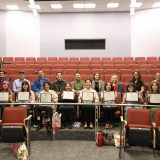Dr. Walsh publishes Space Policy article
November 30, 2012
Dr. Justin Walsh
is a Greek archaeologist whose work has concentrated on the archaic and classical settlement of Morgantina, in central Sicily. The looting of that site by illicit diggers over many decades drew his attention to the ways in which cultural heritage has or has

not been protected from damage and destruction.
A question about
Tranquility Base
from a student in a seminar on heritage in 2008 led him to explore the problem of preserving significant objects and sites in space.
He co-authored an op-ed about the dangers posed by the Google Lunar X Prize competition in the Los Angeles Times with that student in 2009 (
“Don’t Boldly Go There,” 1 June
). His work on the subject has developed into lectures to space scientists at the Committee on Space Research’s biennial assembly in Bremen, Germany (2010) and at the Jet Propulsion Laboratory in Pasadena (2012).
His latest work on the subject is an article in the journal
Space Policy
, in which he argues for a new international treaty regime, modeled on existing treaties regarding heritage in similar contexts — under the high seas and in Antarctica.
While the international community has acted forcefully since World War II to protect sites and objects of cultural or historic significance on Earth, little attention has been paid to the same kinds of sites and objects in space. There are important ethical and scholarly reasons for wanting to preserve sites and in situ objects in off-Earth contexts from destruction or commercial exploitation. Innovative space research equipment, such as spacecraft, satellites, and space stations, and the locations of historic missions, such as Tranquility Base, therefore deserve formal international recognition and protection. Appropriate models for developing a comprehensive protective scheme can be found in existing international protocols, especially the 1959 Antarctic Treaty (and later additions), the 1970 UNESCO Convention on Cultural Property, the 1972 UNESCO World Heritage Convention, and the 2001 UNESCO Convention on the Underwater Cultural Heritage. In addition, space agencies and professional organizations can mandate adequate and ethical planning for the post-operational phases of space missions to include arrangements for heritage protection.
The article citation is
“Protection of Humanity’s Cultural and Historic Heritage.” Space Policy 28 (2012): 234-243.

